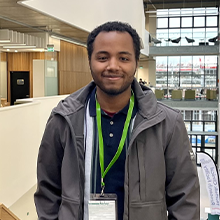Centre for Microbial Interactions: A Q&A with Keni Duguma
18 April 2024

The Microbiology Society set up this internship to support our members developing the new Centre for Microbial Interactions at Norwich Research Park. During the internship, Keni Duguma worked with colleagues at the Microbiology Society, and supported our members in Norwich to establish a stronger identity of the microbiology community in Norfolk. Our former President Judith Armitage has been working to help the Norfolk-based microbiologists strengthen the links between the vibrant group of researchers based in Norwich.
In this Q&A, Keni Duguma talks about his internship experience, and we hear from Dr Sam Rowe, Project Manager at the Centre for Microbial Interactions who supported Keni throughout the internship.
Could you introduce yourself and your scientific interests?
My name is Keni and I recently graduated from the University of Bristol with a degree in Cellular and Molecular Medicine. My academic background is heavily related to medical microbiology, medical virology, developmental genetics and embryonal cancer, and regenerative medicine. Previously, I did work experience at a GP surgery and the Refugee Council.
Could you tell us more about what you worked on during the internship?
I recently completed my role as a Project Intern at the Microbiology Society, where I mainly worked with the members at Norwich to support the new Centre for Microbial Interactions (CMI). I worked closely with Mark Webber and Sam Rowe from the CMI and Priya from the Microbiology Society.
I wrote and published my first blog on the Quadrum Institute’s website, entitled ‘how do processed foods affect the gut-brain axis’. I received helpful feedback from Sam, who taught me the process of blog writing. This has been an invaluable experience in writing a scientific blog for lay audience.
I also researched and wrote a blog for the John Innes Centre (JIC) about the interactions between plants and microbes. I read many research papers to familiarize myself with the scientific content.
My main task throughout the internship was writing a dissertation-style review about the microbiology scene in the Norwich Research Park (NRP) and the rest of the UK. My supervisor, Sam from the CMI, supported me throughout the review process. The review introduces the NRP and its six core partners: John Innes Centre (JIC), Earlham Institute (EI), Quadram Institute (QI), University of East Anglia (UEA), Norfolk and Norwich University Hospitals (NNUH), and The Sainsbury Laboratory (TSL). Including their key research strengths, cutting-edge facilities, and training opportunities. It also outlines the diverse areas of research at NRP, ranging from microbial genomics to environmental microbiology – and sheds light on collaborative projects, the significance of interdisciplinary work, and contributions to groundbreaking discoveries. The review also includes a case for the NRP COVID-19 response and the six key themes of microbiological research at the NRP.
Dr Sam Rowe, Project Manager, Centre for Microbial Interactions said about the internship: “It was great to work with Keni as we develop the new Centre for Microbial Interactions at Norwich Research Park. He did an excellent job reviewing the microbiology landscape in Norwich and writing blog articles for a non-specialist audience. We really appreciate all the support from the Microbiology Society in setting up this internship and look forward to sharing more information about the new Centre over the coming months.”
What opportunities did the internship give you?
It has been great working with both staff at the Microbiology Society and the NRP, who have been incredibly friendly and welcoming. Through my internship, I had the opportunity to meet great people. Their guidance and support not only deepened my understanding of microbiology but also fostered personal and personal growth. I was fortunate to witness the hard working and collaborative atmosphere at the Microbiology Society.
I also had the opportunity to visit the NRP and meet the team in Norwich during the Microbes in Norwich Symposium. There were many interesting talks and posters covering different aspects of new microbiology research at Norwich. The symposium has inspired me to continue to pursue biological research and to keep updated on emerging research trends and methodologies.
How has this internship contributed to your career and scientific development?
The internship allowed me to develop my formal and informal scientific writing skills through writing the dissertation style review and the blogs. The internship gave me the chance to write a blog topic of my choice, so I was able to dive into microbiological research that piqued my interests the most. Also, the internship gave me the opportunity to have a better grasp of the current microbiology research around the UK and the different learned societies and research funding bodies supporting the microbiology landscape.
The Microbes in Norwich Symposium I attended provided valuable insights on bioinformatics involvement in guiding studies and developing innovative strategies for disease control. As my plan is to pursue a master’s degree in bioinformatics this year, I found this incredibly useful in providing me with insights on the uses of bioinformatics in microbiological research.
Overall, the internship continued to inspire me to pursue a career in biological research and gave me valuable skills to implement in my scientific writing in the future.


